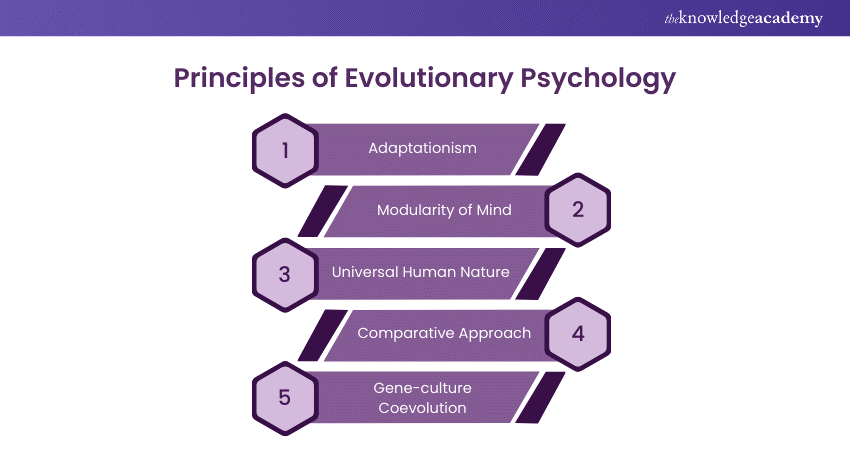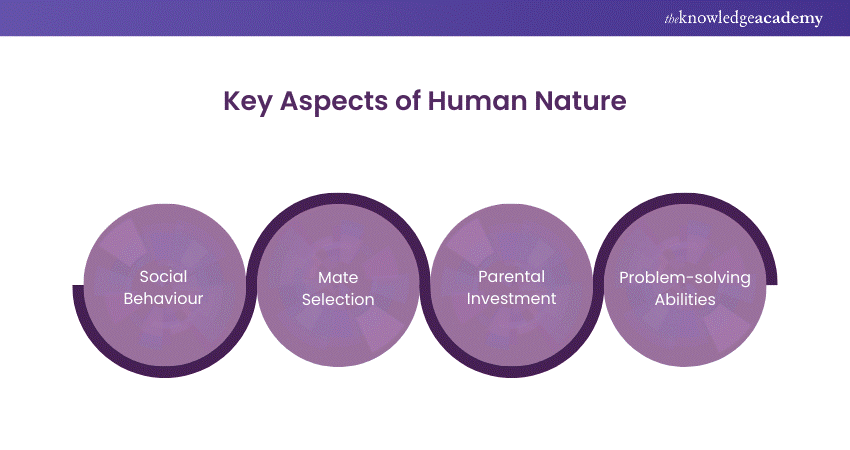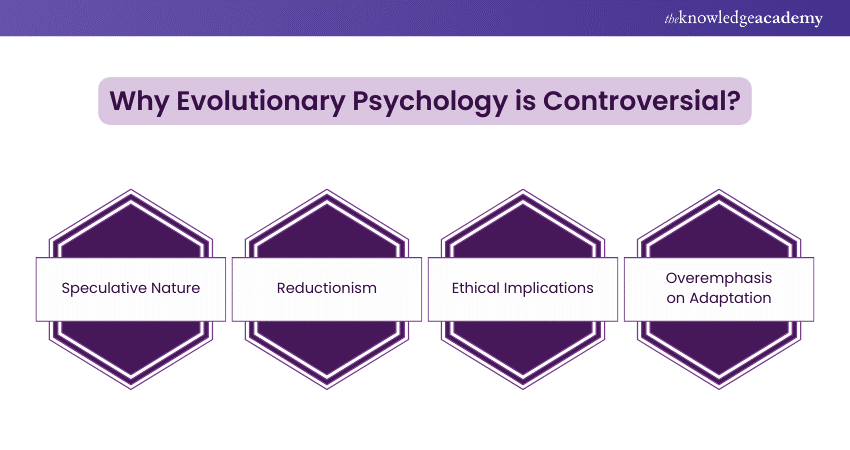We may not have the course you’re looking for. If you enquire or give us a call on +44 1344 203 999 and speak to our training experts, we may still be able to help with your training requirements.
Training Outcomes Within Your Budget!
We ensure quality, budget-alignment, and timely delivery by our expert instructors.

Imagine our ancestors navigating the ancient savannas, their minds honed by millennia of survival challenges. Evolutionary Psychology suggests that many of our psychological traits—our fears, desires, and social behaviours—are like ancient tools handed down through generations. These mental adaptations helped our forebears thrive in their environments, whether it was avoiding predators or forming alliances.
Now, fast-forward to today. We’re still carrying these ancient psychological blueprints, but they sometimes clash with our modern lives. Why do we fear spiders or heights? Why do we crave social approval? And why does this field spark heated debates? Buckle up—we’re about to explore the evolutionary roots of our minds!
Table of Content
1) Understanding Evolutionary Psychology
2) History and Background
3) Modern Evolutionary Psychology
4) Principles of Evolutionary Psychology
5) Human Nature Explained
6) How Evolution Explains Fear and Phobias?
7) Why Evolutionary Psychology is Controversial?
8) Conclusion
Understanding Evolutionary Psychology
Evolutionary Psychology is a theoretical approach to psychology that attempts to explain mental and psychological traits—such as memory, perception, and language—as adaptations. These traits are functional products of natural selection. This discipline seeks to understand how human behaviours and mental processes have developed over time, focusing on solving problems related to survival and reproduction.
History and Background
Here's a table highlighting the key milestones in the history and development of Evolutionary Psychology:
|
Time Period |
Event/Milestone |
Key Figures |
Significance |
|
1859 |
Publication of "On the Origin of Species" |
Charles Darwin |
Laid the groundwork for understanding species evolution through natural selection. |
|
Early 1900s |
Exploration of applying evolutionary theory to human behaviour |
William James |
Suggested human behaviours could be understood in terms of their evolutionary origins. |
|
Mid-20th century |
Development of ethology, the study of animal behaviour in natural contexts |
Konrad Lorenz, Nikolaas Tinbergen, Karl von Frisch |
Emphasised the role of innate behaviours and studying organisms in natural environments, foundational for Evolutionary Psychology. |
|
1980s - 1990s |
Emergence of Evolutionary Psychology as a formal discipline |
Leda Cosmides, John Tooby, David Buss |
Proposed that the human mind consists of specialised modules evolved to handle specific adaptive problems. |
This table captures the progression of key events and figures that have shaped the field of Evolutionary Psychology.
Modern Evolutionary Psychology
Modern Evolutionary Psychology is a dynamic and rapidly growing field that integrates principles from evolutionary biology with the study of human cognition and behaviour. Researchers in this field aim to uncover the evolutionary roots of human mental faculties and behavioural tendencies.
A key aspect of modern Evolutionary Psychology is its focus on the Environment of Evolutionary Adaptedness (EEA). This term refers to the set of ecological and social conditions under which human psychological traits evolved. Understanding the EEA helps researchers identify the adaptive problems our ancestors faced and reveals how these problems shaped the development of psychological mechanisms.
Modern Evolutionary Psychologists employ a variety of research methods, including comparative studies of different species, cross-cultural studies, and experiments designed to test evolutionary hypotheses. They explore different topics, including mating behaviours, kinship, cooperation, aggression, parenting, and social hierarchies.
Transform your workplace dynamics with our Psychology Of Behaviour At Work Training - Join now!
Principles of Evolutionary Psychology
Evolutionary Psychology is grounded in several core principles that guide research and theory in the field.

a) Adaptationism: This principle posits that many human behaviours and mental processes are adaptations—traits that evolved because they increased the reproductive success of our ancestors. These adaptations are solutions to specific problems encountered in the Environment of Evolutionary Adaptedness (EEA).
b) Modularity of Mind: Evolutionary Psychologists propose that the human mind is composed of multiple specialised modules, each evolved to handle different adaptive tasks. For example, there might be distinct modules for language acquisition, social exchange, and threat detection.
c) Universal Human Nature: Despite cultural variations, Evolutionary Psychology suggests that there is a universal human nature—a set of shared psychological traits and behaviours common across all human societies. These traits are the result of shared evolutionary pressures.
d) Comparative Approach: By comparing human behaviours and psychological traits with those of other species, Evolutionary Psychologists gain insights into the evolutionary origins of these traits. This approach helps identify which aspects of human behaviour are unique and which are shared with other animals.
e) Gene-culture Coevolution: Evolutionary Psychologists recognise that human evolution is influenced by the interaction between genetic and cultural factors. Culture can shape the selection pressures faced by individuals, leading to the coevolution of genes and cultural practices.
Understanding Human Nature
Human nature encompasses the fundamental characteristics and behaviours that define us. Evolutionary Psychology explains these traits as products of natural selection, where traits that enhanced survival and reproduction were passed down through generations. Key aspects of human nature explained by Evolutionary Psychology include:

a) Social Behaviour: Humans are inherently social creatures, a trait that helped our ancestors survive. Social cooperation was crucial, as forming alliances and understanding social hierarchies improved the chances of survival.
b) Mate Selection: Preferences in mate selection can be traced back to evolutionary pressures. Traits such as physical attractiveness, resource availability, and parenting potential played significant roles in reproductive success.
c) Parental Investment: Differences in parental investment strategies between males and females are also explained through evolutionary pressures. Typically, females invest more in offspring due to the higher biological costs of reproduction, influencing mating behaviours and preferences.
d) Problem-solving Abilities: Cognitive abilities, such as problem-solving and tool use, are crucial for survival and have been honed over millennia. This includes language development, memory, and learning capabilities.
How Evolution Explains Fear and Phobias?
Fear is an emotion that has evolved to protect us from danger. However, Evolutionary Psychology distinguishes between healthy fear and irrational fear, anxiety, and phobias.
Healthy Fear
Healthy fear is an adaptive response to threats that enhances survival. It prepares the body to either confront or flee from danger—this reaction is known as the "fight or flight" response. This type of fear is beneficial and necessary for survival.
a) Predator Avoidance: Fear of predators or dangerous animals would have been crucial for our ancestors. This explains why people commonly fear snakes; spiders and large carnivores evoke similar responses.
b) Environmental Hazards: Natural dangers such as heights or deep water also elicited fear responses that kept our ancestors safe. Modern humans still exhibit these fears despite living in safer environments.
c) Social Threats: Fear of social rejection or ostracism can be linked to our ancestors' reliance on social groups for survival. Being part of a group provided protection and essential resources.
Irrational Fear, Anxiety and Phobias
While healthy fear is adaptive, irrational fears, anxiety, and phobias can be maladaptive. Evolutionary Psychology provides insights into why these seemingly irrational responses exist.
a) Overgeneralisation: Sometimes, fear responses can become overgeneralised. For instance, a person may develop a phobia of all snakes after a single frightening encounter, even if most snakes pose no threat.
b) Mismatch Theory: This theory suggests some fears are mismatched with modern environments. Ancestral environments have threats different from those we face today, yet our fear mechanisms remain the same. For example, the fear of public speaking might stem from a deeper fear of social exclusion.
c) Genetic Predisposition: Certain phobias and anxieties may have a genetic component, passed down because they offered some survival advantage, even if the exact nature of this advantage is unclear today.
Learn the principles of well-being with our Positive Psychology Course – Join today!
Why Evolutionary Psychology is Controversial?
Despite its insights, Evolutionary Psychology is not without controversy. Critics argue against the field on several grounds.

a) Speculative Nature: Critics claim that many hypotheses in Evolutionary Psychology are speculative and difficult to test empirically. The field often relies on post hoc explanations, making it challenging to falsify theories.
b) Reductionism: Some argue that Evolutionary Psychology reduces complex human behaviours and social structures to simplistic evolutionary explanations, ignoring cultural, social, and environmental factors.
c) Ethical Implications: Concerns exist about the ethical implications of attributing behaviours to evolution, particularly when justifying harmful behaviours or social inequalities as "natural."
d) Overemphasis on Adaptation: Critics point out that not all traits are adaptive. Some may be byproducts of evolution (spandrels) and not direct results of adaptive processes.
Gain an understanding of the prevention theories with our Prevention Psychology Training – Join today!
Conclusion
Evolutionary Psychology provides a framework for understanding human behaviour by tracing its roots to evolutionary processes. By examining how traits such as social behaviour, mate selection, and fear have developed over time, we gain valuable insights into the adaptive nature of these characteristics. This perspective helps us understand the underlying reasons for certain behaviours, offering a deeper appreciation of the complex interplay between our biology and environment.
Frequently Asked Questions

Yes, creativity offers specific evolutionary advantages by enhancing problem-solving abilities, facilitating social bonding, and improving adaptability to changing environments.

Cultural influences and Evolutionary Psychology work together to shape creativity by blending learned cultural practices with inherited traits. This combination helps individuals develop unique and innovative ideas.

The Knowledge Academy takes global learning to new heights, offering over 30,000 online courses across 490+ locations in 220 countries. This expansive reach ensures accessibility and convenience for learners worldwide.
Alongside our diverse Online Course Catalogue, encompassing 17 major categories, we go the extra mile by providing a plethora of free educational Online Resources like News updates, Blogs, videos, webinars, and interview questions. Tailoring learning experiences further, professionals can maximise value with customisable Course Bundles of TKA.

The Knowledge Academy’s Knowledge Pass, a prepaid voucher, adds another layer of flexibility, allowing course bookings over a 12-month period. Join us on a journey where education knows no bounds.

The Knowledge Academy offers various Mental Health Trainings, including Anxiety Courses, Child Psychology Course and Social Psychology Trainings. These courses cater to different skill levels, providing comprehensive insights into the Child Psychology.
Our Health & Safety Blogs cover a range of topics related to Psychology, offering valuable resources, best practices, and industry insights. Whether you are a beginner or looking to advance your Mental Health knowledge, The Knowledge Academy's diverse courses and informative blogs have you covered.
Upcoming Health & Safety Resources Batches & Dates
Date
 Psychology Course
Psychology Course
Fri 14th Feb 2025
Fri 11th Apr 2025
Fri 13th Jun 2025
Fri 15th Aug 2025
Fri 10th Oct 2025
Fri 12th Dec 2025







 Top Rated Course
Top Rated Course



 If you wish to make any changes to your course, please
If you wish to make any changes to your course, please


